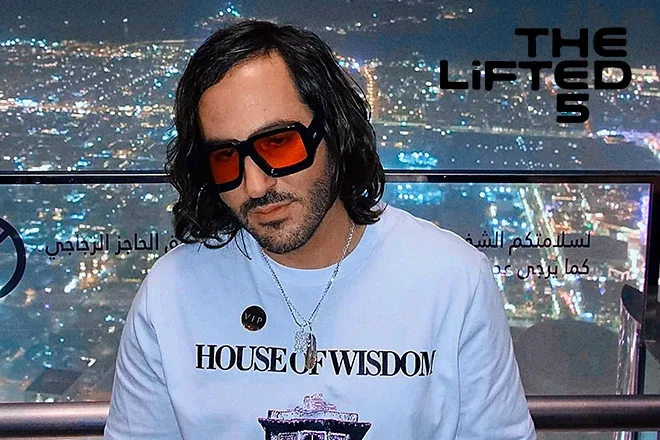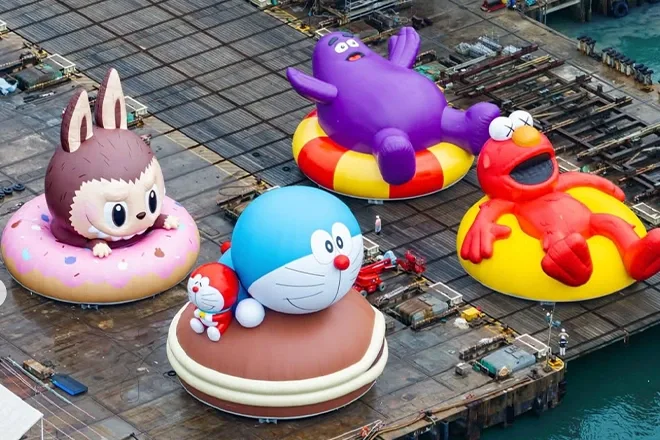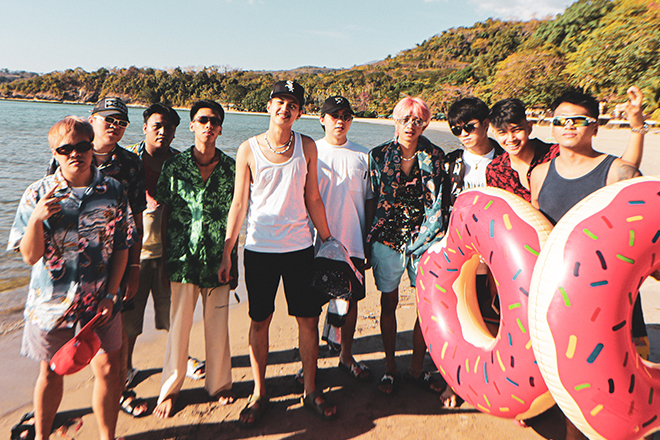Interview
The LiFTED 5 with Grammy-winner Peyote Beats
“I knew from the start that I wanted to be a part of Japan’s music scene.”
When it was announced that Doechii’s Alligator Bites Never Heal won Best Rap Album at the Grammys over Future and Metro Boomin’s We Don’t Trust You, Eminem’s The Death of Slim Shady, Common and Pete Rock’s The Auditorium, and J. Cole’s Might Delete Later a week ago, the world shook because a new era of Hip Hop has begun. For Peyote Beats, an Armenian-American producer who had a song on the album and is now a Grammy winner, not much changed, but everything changed.
LiFTED caught up with Peyote Beats to learn his origin story, how he has deep ties producing Japanese Hip Hop, and if going platinum is better than winning a Grammy.
How did you get into producing Hip Hop music?
Hip Hop has always been in my life, even when I was playing in rock bands in high school, and we were covering Dr. Dre songs. I remember when College Dropout came out, I bought the CD at Borders, and I was never the same again. I wanted to learn what producing was because of what Ye was doing at the time. After high school, I went to a university for business, but I was producing at the same time. Around 2015, I discovered the new generation of Rap, which was Lil Yachty, Playboi Carti, and that whole Soundcloud Era. That’s what made me get into producing Hip Hop on a professional level, and it was how I got my start in my career.
You’ve worked with a lot of Japanese Hip Hop artists like Yuki Chiba, Nene, JP THE WAVY, and more. How did that part of your career get started? You mentioned doing traditional Enka songs with Yuki. Can you please explain what that is? Any Asian Hip Hop artist that you haven’t worked with yet that you would really like to?
While many Americans loved Japanese culture for anime and the food, as a kid I was listening to their music and learning about their artists very early on in my life. I knew from the start that I wanted to be a part of Japan’s music scene. Fast forward to 2015, around the same time I started producing for Soundcloud rappers, and I managed to get my first placement with a rapper named J-$tash, who was also well-known in the Asian Rap scene. I saw that he had some records with Yuki Chiba, who was known as KOHH at the time, so I managed to flag him down and get him to my studio.
It was around 2016 that we started working together so it’s been almost 10 years now. He released a track that I produced for him titled ‘GTA,’ and that would be my entry into working with Japanese artists. Yuki and I made several Rap tracks together in the past nine years. In 2023, I visited Tokyo for the first time, and Yuki and I got straight to work on new records. He showed me a legendary Enka artist named Saburo Kitajima, and I was instantly hooked. From then on we made ‘Jameson & Ginger’ the first in our Enka series. We both loved the sound so much that we made an album’s worth of songs in that style.
During my Japan trips in the last two years, I also got a chance to work with JP THE WAVY, Nene, Young Coco, and Vigorman, who I’ve made several tracks with. Also, I work with producers Koshy, GeG, Taka Perry, MoreBuxx, Trill Dynasty, and more. Recently, I’ve done work with J-Pop acts as well with my frequent collaborator and Japanese legend, Her0ism, who has produced many hits for artists including XG, the NEWS, and more. Her0ism has taught me so much about Pop music and the production behind it, so I’m very fortunate that I get to work with him.
How is making beats for some of the cream of the crop like Tyga, Trippie Redd, Blxst, Pop Smoke [RIP], and Jhene Aiko? Is there one crazy story you can tell about one of these Pop artists that will blow our minds?
Making beats for major artists is such a privilege that I don’t take for granted. There’s no better feeling in the world than to produce for artists that you listen to on the regular, especially when they are known on a global scale. That’s why I set out to do this, to be a part of the biggest projects in music history. It certainly was not easy in the beginning, but I managed to always use my work as leverage to get me to my next record or artist.
The record that I produced for Trippie Redd, ‘Never Ever Land,’ was the beginning and entry point into working with major artists. I’ve noticed that the more established the artist is, the more confident they are in knowing what sound they want, and this is the reason for their success. I’ve done all of this on my own without a team or management and with the help of certain people who took a shot at working with me. I feel so fortunate to have worked with artists who will go down in history and to know that my work is eternal with them is the greatest feeling.

Walk the LiFTED readers through what happened with Doechii from the start to winning a Grammy for ‘Boiled Peanuts.’ Did you send over some beats? Did she join you in the studio? Did you feel like she was going to blow up like how she did? How did you feel when you saw her do ‘Boiled Peanuts’ live on The Late Show with Stephen Colbert? Did you expect her to win the Grammy?
Back in July, I managed to connect with the head of TDE’s A&R, Chey Chaves, who was kind enough to bring me into TDE’s offices for a meeting. At this meeting, a few other A&Rs were also in attendance and took the time to listen to my beats that I had ready for various TDE artists. After the meeting, I received a call a couple of days later from their team asking me to make them a beat specifically for Doechii in the Boom Bap style.
I got straight to work, and in a matter of a couple of hours, we were sending each other notes and edits back and forth until we got what they were looking for. Doechii cut to my beat and a few weeks later it made it on her album Alligator Bites Never Heal as track # 3, ‘Boiled Peanuts.’ It was such a natural way of getting a record, and I was lucky enough to have them trust me at the very beginning of our relationship. I never expected her project to blow up the way it did, but then I realized the reason it was doing so well was because Doechii had found a pocket that was not entertained by other female rappers. She was rapping about real life and not about vanity, money, or sex like most rappers do today. She was respected by the new and also the elders of Hip Hop.
To have my song performed on Colbert and NPR’s Tiny Desk was a dream come true. There’s no better feeling than to have your work shared with the rest of the world. Come November of last year, when I had just landed in Tokyo, it was about 4 a.m., and I was still in bed. I started to get notifications on my phone that Doechii received the Grammy nomination for Best Rap Album. I was blown away and definitely shed a tear or two while lying in bed all the way in Tokyo. It took 10 years of my career for me to achieve even this nomination. Just last weekend the Grammys took place, and I got a chance to attend as it was my first time. We took home Rap Album of the Year in a category that also included Eminem, Metro Boomin/Future, and J Cole. It is still surreal to me and hasn’t connected yet but I’m soaking it all in!
What has changed now that you will have Grammy-winner next to your name forever? What are the plans for 2025 and beyond?
I think for myself, not much has changed as the next day, I was back in the studio working with producers. I’m so grateful to have the title, but I’ll still be going into it working just as hard as I did before the achievement. My plans for 2025 are to keep working with my favorite artists and also tackle a new endeavor of mine, which would be to executive produce entire albums for artists. I’ll also be going back to Japan this year to continue my work with J-Rap and J-Pop as well.
BONUS: Which feels better, going platinum or winning a Grammy? Why?
I would have to say that winning a Grammy feels much better because I know that not many people receive this honor in their lifetime. I don’t think I ever expected it either, so I’m learning to embrace it now.




